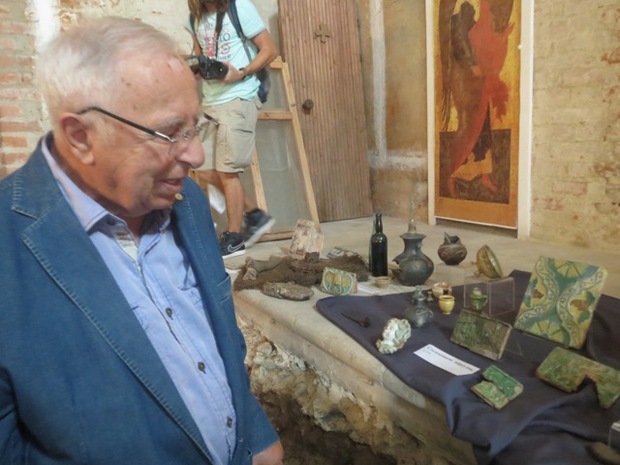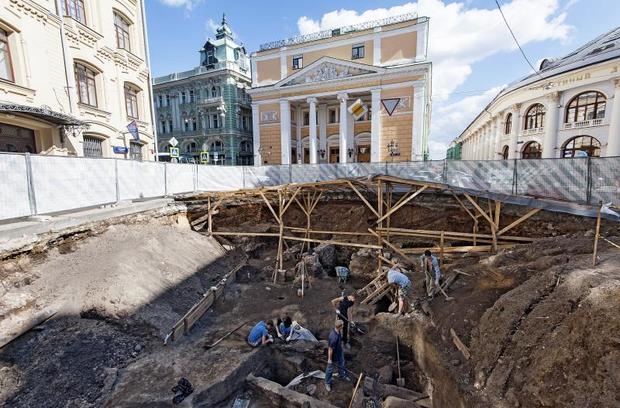Fayaz Khuzin: ''Moscow is more ancient than the middle of the 12th century — there are finds''
The father of the 1000th anniversary of Kazan tells about why the age of Moscow can be revised upwards
When conducting research on the territory of Moscow, archeologists found remains of a settlement, the age of which is not less than 1000 years. The chief archaeologist of Moscow Leonid Kondrashov believes that this discovery will start a scientific debate regarding the fact that Moscow is older by at least by two centuries than it is now commonly believed. Realnoe Vrmeya contacted deputy director on development of the Institute of Archaeology of the Academy of Science of Tatarstan, PhD in Historical Sciences Fayaz Khuzin, who told about whether the ''ancientness'' of the capital of Russia is justified, whether there is politics in this issue and how originally the age of Moscow was determined.
''It is necessary to summarise the material and mark the milestone date of Moscow foundation''
Remains of a settlement, which aged at least 1000 years, have been found in Moscow, so in the near future its age can be revised. Prof Khuzin, what do you think about the revision of the date?
I think the following: it's long past to do. The story is following: I was not an archaeologist yet, but I was already interested in archeology (it was in 1969, if I'm not mistaken), and I opened the magazine Soviet Archaeology and saw an article by Alexander G. Veksler on the age of Moscow, in which he argued that the city was founded not in 1147 but in the 11th century. Many years later, I became an archaeologist, began excavations in the Kazan Kremlin and met with Alexander Grigoryevich. He continued to dig in Moscow and found finds, unequivocally testifying about the earlier time of the rise of Moscow than the 11th century. So I has been waiting for this event for a long time.
Already at the beginning of the 2000s, Veksler had the finds, then the Institute of History started excavations in the limits of Moscow: Leonid A. Belyaev also had interesting finds. That means that this is not some political considerations but a result of many years of large-scale works. The finds are in the center of Moscow as well as in the suburbs, because the area was very densely populated since the end of the first Millennium of our era. It must be so because such big cities do not arise on an empty place — anyway before the city there were settlements, from which Moscow originated.
By the way, among the finds there are also Arab dirhams of the 10th century, which is very important, and the most simple but very important things like fragments of pottery, arrowheads, jewelry — all this is evidence of the early age of the city. It is necessary to summarisse the material and mark the milestone date of the foundation of Moscow.

''Alexander Grigoryevich Veksler found finds, unequivocally testifying about the earlier time of the rise of Moscow than the 11th century.'' Photo: diletant.media
We are well acquainted with the bases for determining the age of Kazan, but could you briefly tell us what bases Moscow has?
First, the most ancient layers of the city are badly preserved, as well as in Kazan. However, there is a layer, it has commercial, residential buildings, plus finds and precisely identified items (I'm talking about coins), which belong to the late 9th or early 10th century.
In general, we talk a lot about 1147, sometimes without warning the reader that this is the earliest mention of the name of Moscow in the Chronicles, but Moscow existed before – it is not the date of the city foundation. Archaeologists ahve undertaken to clarify the time of foundation, with which I congratulate them. I think they're on the right track.
''As for the age of Kazan, it is not so easy''
However, the archaeologists were immediately criticised that it was a PR move and a desire to make money on the research and nothing more...
No, I am saying that Moscow is more ancient than the middle of the 12th century — we have finds. Perhaps, they just didn't pay attention to them and just accepted this later date. The finds are expected.
At the same time, some tend to politicize the issue and say that they want to make Moscow more ancient because the capital allegedly cannot be younger than Kazan and Kiev. Does this assumption make sense?
Only amateurs can say this. Archaeology is a serious science. There are finds, then there is a date. No finds, so it is too early to talk about anything. It was not so easy with Kazan, too — theye say it was politicized, and they still sometimes say that supposedely we did it by order. No, we have grounds. Archaeology doesn't lie.
''Archaeology is a serious science. There are finds, then there is a date. No finds, so it is too early to talk about anything. It was not so easy with Kazan, too — theye say it was politicized, and they still sometimes say that supposedely we did it by order. No, we have grounds. Archaeology doesn't lie.'' Photo: Timur Rakhmatullin
By the way, when we worked on defining the date of origination of Kazan, we collaborated with Moscow and St. Petersburg archaeologists, invited specialists from other cities and foreign countries.
This hypothesis of the young age of Moscow, of course, will be discussed, but I think that it is reasonable to talk seriously about the 1000-year age of the capital (if not even an earlier foundation).
''This does not mean that Moscow was founded by Finns — it was founded by Slavs''
Is it true that Moscow stands on the site of ancient settlements of the Finno-Ugric peoples?
Generally yes, some linguists believe that the word ''Moscow'' has Finnish, not Slavic origin. Before the Vyatichi, this land was Finno-Ugric, but it is ususal, so to speak. We — the Tatars — are also newly arrived, and earlier there also lived Finno-Ugric tribes. North-East of Eastern Europe was inhabited by Finno-Ugric tribes. The Slavic dispersal was a little later, but this does not mean that Moscow was founded by Finns — it was founded by Slavs.
Prof Khuzin, was there Turkic population in Moscow?
They mostly communicated and interacted at the level of trade and cultural relations. I do not think that Kuchkovichi, who were recognized to be the Turks… It is unlikely that other peoples (Finns, Turks) founded the city — there is no reason. It is a Slavonic-Russian city.

''In general, we talk a lot about 1147, sometimes without warning the reader that this is the earliest mention of the name of Moscow in the Chronicles, but Moscow existed before – it is not the date of the city foundation.'' Photo: Aleksander Kozhokhin (vm.ru)
What can you say about the first rulers of the city?
In Tatarstan they say about boyar Kuchko. Among not very professional historians this theory exists, that Kuchkovichi are not Finns, not Slavs, but Turks. But no, the first builders are Slavs.
Actually, it's almost before-Chronichles times and, unfortunately, written sources are few — only archaeology, plus linguistics, which may add to the archaeological information.